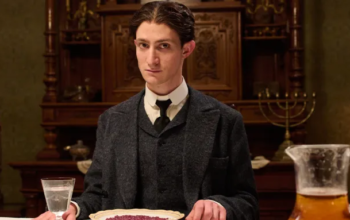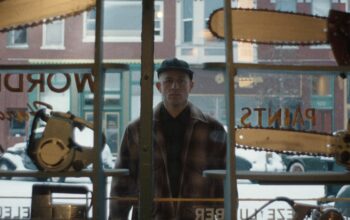An ordinary primary school becomes a terrifying psychological battleground in Laura Wandel’s deeply unnerving first feature.
It has been claimed that women who forget the worst of the pain of childbirth are programmed to do so by evolutionary necessity: The selective editing of the body’s memory of trauma helps ensure the species continues to propagate itself. However true that is, a similar theory might account for why so many of us remember our school days in only the vaguest and fuzziest of terms: If we precisely recalled all those terrors, would we really force our own children to run the same gantlet? Laura Wandel’s janglingly visceral “Playground” is here to shatter that willful forgetfulness by parachuting us with zinging immediacy into the fraught, ferocious battleground of a primary school as though delivering us into the frontline action on a war-torn beachhead.
Seven-year-old Nora (an extraordinary Maya Vanderbeque) is crying, clinging to her father (Karim Leklou) at the school gates. Now, and for the rest of the film, we are at her eye level: Frédéric Noirhomme’s dogged shallow-focus camerawork immediately creates a world where doorknobs and banisters are mounted dauntingly high, and where adults are abstractions, glimpsed only from the midriff down. From this vantage point, an increasingly tangled network of relationships and interactions form an ecosystem that, although just a couple feet below the eye line of the teachers and supervisors nominally in charge, might as well be on a different planet.
In the schoolyard, Nora, disoriented and scared, naturally gravitates toward the one familiar face in this sea of chattering, roughhousing kids: her beloved older brother, Abel (Günter Duret). But Abel pushes her away. At first we suspect this is just regular, callous older-sibling behavior. But soon it becomes clear that Abel’s rejection is also a protective move: He is being viciously bullied, and not only is he reluctant to lose face in front of his admiring kid sister, but he also knows that Nora’s best chance of avoiding a similar fate is not to associate with him.
At first, Nora does have an easier time of it. She makes friends, has giggly lunchtime confabs and finds a favorite teacher (Laura Verlinden), the only adult aside from her father who occasionally dips down into Nora’s world, talking across to her rather than down at her. But then Nora happens on Abel being pushed around by his classmates, and “Playground” ramps up into a gripping psychological drama in which the decisions Nora must make — whether to go against Abel’s wishes and alert an adult, which risks further escalation; whether to allow her own social stock to fall by acknowledging her misfit brother — take on the proportions of gargantuan moral dilemmas, made all the more intractable because she has to navigate them alone, using a moral compass that has never been taken out of its casing before.









